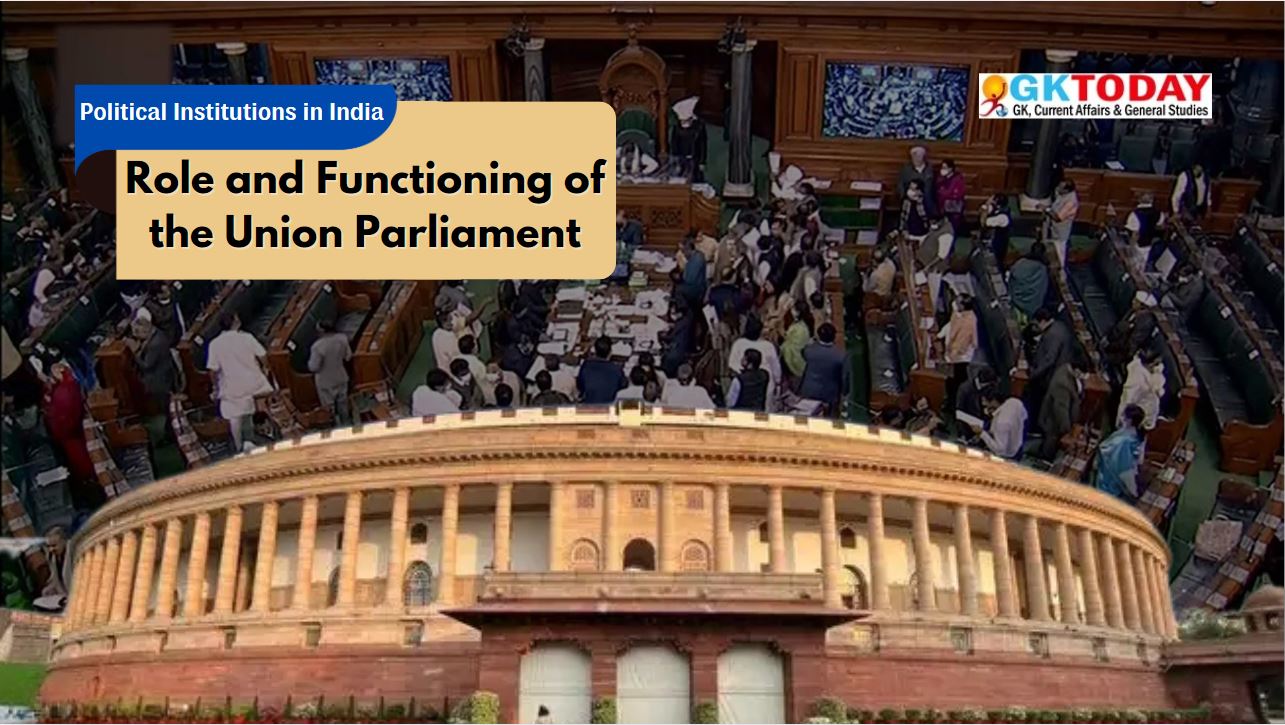Role and Functioning of the Union Parliament in India [UGC NTA NET Political Science Notes]
The Union Parliament of India is responsible for making laws, overseeing the executive, and representing the interests of the citizens. The Parliament operates within a bicameral structure, consisting of the Lok Sabha and the Rajya Sabha. Each house has distinct roles and responsibilities, contributing to the governance of the nation.
Structure of the Union Parliament
The Union Parliament is a bicameral legislature, which includes two houses:
Lok Sabha (House of the People)
- Directly elected by the people of India.
- Maximum strength is 552 members.
- Consists of 530 members from states and 20 from Union territories.
- Members serve a term of five years unless dissolved earlier.
Rajya Sabha (Council of States)
- Indirectly elected by the elected members of State Legislative Assemblies.
- Maximum strength is 250 members.
- 238 members are from states and Union territories, with 12 nominated by the President.
- It is a permanent house; one-third of its members retire every two years.
Functions of the Union Parliament
The Union Parliament serves multiple functions that are crucial for the governance of India.
Legislative Functions
- Enacts laws on subjects in the Union List and Concurrent List.
- Can amend the Constitution, requiring a special majority.
- Types of legislation include:
- Ordinary Bills
- Money Bills (must be introduced in Lok Sabha)
- Finance Bills
- Constitutional Amendment Bills
Executive Functions
- Approves the appointment of the Prime Minister and other ministers.
- Holds the executive accountable through questions and debates.
- Can pass a vote of no confidence against the Council of Ministers.
Financial Functions
- Controls public expenditure and taxation.
- The Union Budget is presented in Lok Sabha.
- Money Bills can only be introduced in Lok Sabha.
Constituent Functions
- Amends the Constitution.
- Can initiate constitutional amendments.
Judicial Functions
- Can impeach the President, Vice President, and judges of the Supreme Court and High Courts.
- Conducts inquiries and investigations.
Electoral Functions
- Elects the President and Vice President of India.
- Participates in the election of Rajya Sabha members.
Role of the Speaker
The Speaker of the Lok Sabha plays a vital role in maintaining order and facilitating the legislative process.
- Presides over Lok Sabha sessions.
- Maintains order and decorum in the house.
- Decides on points of order and manages debates.
- Has the authority to disqualify members under the Anti-Defection Act.
Role of the Chairman
The Chairman of the Rajya Sabha is the Vice President of India.
- Serves as the ex-officio Chairman of Rajya Sabha.
- Presides over Rajya Sabha sessions.
- Has a casting vote in case of a tie.
Parliamentary Committees
Parliamentary Committees play an essential role in the legislative process.
- Standing Committees – Permanent committees reviewing legislation and policies.
- Select Committees – Examine specific bills in detail.
- Joint Committees – Comprise members from both houses for specific purposes.
- Ad hoc Committees – Temporary committees for specific tasks.
Legislative Process
The legislative process involves several key stages:
- Introduction of Bills – Can be introduced by ministers or private members.
- First Reading – Introduction and circulation of the bill.
- Second Reading – General discussion on the bill.
- Committee Stage – Detailed examination and amendments.
- Report Stage – Further consideration and amendments.
- Third Reading – Final approval.
- Rajya Sabha Consideration – Lok Sabha bills must be passed by Rajya Sabha.
- Presidential Assent – Bills become law after receiving the President’s assent.
Sessions of Parliament
Parliament operates through various sessions throughout the year.
- Types of Sessions:
- Budget Session
- Monsoon Session
- Winter Session
- Summoning and Prorogation – Summoned by the President; prorogued at the end of each session.
Parliamentary Privileges
Parliamentary privileges ensure the independence of the legislature.
- Freedom of speech in Parliament.
- Right to publish debates and proceedings.
- Protection from arrest in civil cases during sessions.
Role in Governance
The Union Parliament plays important role in governance.
- Acts as a check on the executive.
- Represents the interests of the public.
- Facilitates discussion on national issues.
Challenges and Criticisms
Despite its importance, the Union Parliament faces several challenges.
- Issues of quorum and attendance affect legislative efficiency.
- Political disruptions and adjournments hinder the functioning of Parliament.
- Influence of money and muscle power in elections raises concerns about fairness.
The Union Parliament of India is integral to the democratic process. Its structure, functions, and challenges reflect the complexities of governance in a diverse nation. About the Parliament’s role enhances knowledge of India’s political landscape.





